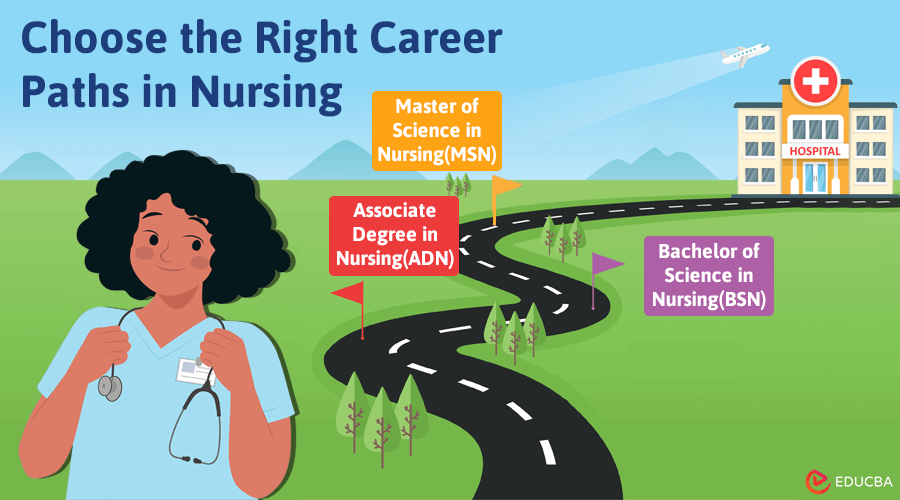
Introduction to Career Paths in Nursing
Nursing is not just a profession; it is a noble endeavor in which professionals use compassion, critical thinking, and commitment to improve the lives of others. Beyond the traditional image of nurses working in hospitals, the nursing field offers many diverse career paths and specializations. From bedside care to research, education, and leadership roles, nurses can carve out a fulfilling career tailored to their interests and strengths. In this article, we will look into the various career paths in nursing and explore the unique opportunities each one offers.
Best 3 Career Paths in Nursing
Some of the best career paths in nursing include:
#1. Associate Degree in Nursing (ADN)
An ADN is a two-year undergraduate program offered by community colleges and some four-year institutions. It gives students the knowledge and skills to become registered nurses (RNs). ADN programs usually combine classroom instruction with clinical experience in healthcare settings, allowing students to gain hands-on experience in patient care.
Upon completing an ADN program and passing the NCLEX-RN exam, graduates can become licensed RNs and begin working in various healthcare settings, such as hospitals, clinics, nursing homes, and community health agencies. While an ADN provides a pathway to entry-level nursing positions, some nurses pursue a Bachelor of Science in Nursing (BSN) degree, which can offer additional career opportunities and advancement.
#2. Bachelor of Science in Nursing (BSN)
A BSN is a four-year undergraduate program offering extensive education in nursing practice, theory, and research. It contrasts with Associate Degree in Nursing (ADN) programs by providing a more expansive and thorough curriculum. In addition to coursework in nursing fundamentals, BSN students study anatomy, physiology, pharmacology, microbiology, psychology, and nursing leadership.
One of the distinguishing features of BSN programs is the emphasis on evidence-based practice and critical thinking skills. BSN graduates can deliver high-quality, evidence-based care to patients in diverse healthcare settings. They also undergo training in leadership, management, and communication abilities, equipping them for roles in nursing administration, education, research, and advanced clinical practice, including Locum Nurse Practitioner Jobs, where their expertise can be applied in various healthcare settings.
In recent years, there has been an increasing demand for nurses to acquire a Bachelor of Science in Nursing (BSN) because of the rising intricacy of healthcare provision and the changing healthcare environment. Many healthcare institutions and professional organizations now recommend or require nurses to hold a BSN for entry into practice or career advancement. For individuals already holding an RN license, online rn to bsn nursing programs offer a flexible option to advance their education and career prospects without sacrificing their current jobs.
#3. Master of Science in Nursing (MSN)
For nurses aspiring to positions in advanced practice, leadership, education, or specialized fields such as nurse practitioner or clinical nurse specialist, an MSN is essential. These programs generally require a BSN for admission and take 1-3 years to complete, depending on the area of specialization and the pace of study.
MSN programs focus on advanced clinical skills, research methodologies, and leadership training. They prepare nurses for roles that have a significant impact on patient outcomes and the broader healthcare system.
An MSN also opens doors to doctoral programs in nursing, which are for individuals interested in scholarly research or top-level administrative roles within healthcare organizations.
Final Thoughts
When choosing between an ADN, BSN, or MSN in nursing, consider your current life situation, career goals, finances, and how much time you can dedicate to education. Each degree offers different opportunities and paths in nursing:
- If you want to start working as a nurse immediately, an ADN could be the right choice.
- For broader career opportunities and a solid foundation for moving up, go for a BSN.
- If you aim for advanced roles like nurse practitioner or nurse manager, you will need an MSN.
Your decision should match where you see yourself heading in your nursing career. With the demand for nurses growing, all these paths offer good job prospects. Ensure you thoroughly investigate programs, examining aspects such as accreditation and pass rates, to find the optimal match for your goals.
Recommended Articles
If you found this article on ‘Career Paths in Nursing’ helpful and want to learn more about related topics, please check the links below.

